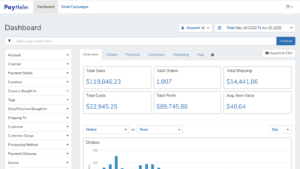Why Your Ecommerce Store Desperately Needs a Backup Strategy

The 2020 Ecommerce Data Protection Report says one of four online stores have permanently lost vital business data. Think images, product listings, customer information, inventory counts and much more.
All this information helps an ecommerce entrepreneur drive and grow their business. Without it, you are operating blind. And trying to restore it involves more than a few mouse clicks. Without a backup strategy, if your web store goes down, and its data is lost, then you’re virtually (and maybe literally) out of business.
As an ecommerce entrepreneur, you’re busy sourcing, listing, selling, and shipping.. Your online store is humming along nicely — and even growing. But it could all go away in a nanosecond for way too many reasons. ECybersecurity professionals say that there are two kinds of people: those who have lost data, and those who are about to lose data. The three primary causes of data loss? Human error, software glitches, and malicious attacks.
Ecommerce businesses are particularly vulnerable to the latter. In fact, they’re the target of nearly 1/3 of all cyber attacks. In 2019 alone, 10% of small enterprises hit by cyber-attacks were forced out of business according to a 2019 report from CNBC.
Yet black-hat hackers are actually the least of your worries. It’s far more likely that your data will fall victim to people you know. If you, an employee or contractor make a typo when tweaking the coding for your store’s theme, or that terrific new third-party app doesn’t play nice, it can wreak havoc with your site’s functionality and finances. In a survey of 300 ecommerce merchants, over 90% said sales would immediately nose dive if they lost business data:
As you can see, lost sales aren’t the only negative impact. First-time shoppers who come to your store may never come back, while repeat customers may find somewhere else to buy. They may decide that you’re no longer trustworthy.
In addition, you’ve lost all of the hard work, time, and money that went into building your store. Good luck re-creating it all from memory! Downtime also damages your SEO ranking and decimates productivity while all hands are on deck trying to get your store back up and running. You need a backup strategy — and you need it at the most granular level. To be effective it should be
- Updated as often as your website changes
- Stored somewhere other than on your server/website
- Easy to access and restore when you need it most
Your ecommerce service provider (e.g., Shopify or BigCommerce) unfortunately can’t do this for you. They operate on the basis of “shared responsibility”. That means they are responsible for their own software, infrastructure, and disaster recovery. If a rogue asteroid wipes out one of their data centers, they’ve got a macro-backup ready to use in recovering the platform and restoring it to its previous state.
But they can’t restore your individual account. As a merchant, you’re responsible for password security, permissions given to users and third-party providers, and (most importantly) backing up any data you put into your store.
That’s where a service like Rewind comes in. Recommended by both Shopify and BigCommerce, Rewind offers set-it-and-forget-it peace of mind, automatically backing up all of your cloud-based data every day. You can also run a manual backup any time you need to, such as before you attempt a bulk edit via CSV import. (CSV imports are notorious for causing data losses.)
Better yet, Rewind lets you restore lost data for a single item, multiple items, parts of your store, or your entire store. Think of it as a magic “Undo” button. With Rewind, you can be back in business in minutes instead of hours. You wouldn’t walk a high wire without a safety net — would you? — so don’t try to run your online store without one, either.
While PayHelm enables you to build the future of your business, Rewind empowers you to preserve its past and protect its present.






























